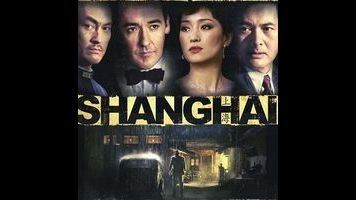The long-delayed spy flick Shanghai offers noir without the style

Pulp without style: Shanghai has many of the staples of noir—back alleys, shadowy figures, hard-boiled narration, and more femmes fatales than a viewer could keep track of—but none of the atmosphere or cool. Scripted by Hossein Amini (Drive, The Two Faces Of January) and set in Shanghai’s international settlement zone in the months before Pearl Harbor, this long-delayed wartime spy flick has no shortage of spider-web intrigue, tangled with Japanese interests, German attachés, local gangsters, Western expats, opium dens, and resistance cells. (Kudos to anyone who can work out everyone’s motivations during the climax.) Mikael Håfström (The Rite, Escape Plan) directs it like he’s sucking too hard on a cigarette, in a quick, over-and-done-with style that results only in fitful coughs of smoke.
John Cusack stars as Paul Soames, a blue blood Naval Intelligence officer with the two archetypal traits of a noir gumshoe: an aura of cynicism and a knack for getting knocked upside the head by goons who enter from just out of frame. (Jadedness is probably inevitable in a line of work that requires you to get whapped unconscious twice a week on average.) Disguised as a pro-Nazi newspaper columnist, Soames arrives on a steamer from Berlin with the intention of meeting up with an old Yale buddy, who is soon found with his throat cut, face down in the city’s Japanese-controlled sector. “It was like being a worm, working your way into a rotten apple,” narrates our man as he follows the scattered clues left behind by his friends: a passport forged in the name of a mystery woman, surveillance photos of Japanese officers, a matchbook with a bat insignia.
There’s a layer of historical irony at work here, as Soames’ American consulate handler (David Morse) repeatedly assures him that Japan is too weakened by fighting in China to do anything but negotiate a treaty with the U.S., while the plot ticks down to December 7, 1941. And so Soames goes about, trying to figure out what this big something involving the Japanese Navy might be, encountering—and occasionally getting knocked out by—a largely overqualified cast of ambiguous local players: counter-intelligence officer Captain Tanaka (Ken Watanabe); well-heeled crime boss Anthony Lan-Ting (Chow Yun-Fat), and his glamorous wife (Gong Li), who may be connected to a recent spate of assassinations; Mrs. Müller (Franka Potene), whose engineer husband may be working on a project with the Japanese; an opium addict (Rinko Kikuchi) whose disappearance might be connected to a larger conspiracy. (Shanghai was shot in 2008 and released in Asia in 2010, and there’s a whiplash factor to seeing, say, a pre-weight-gain Benedict Wong play a young Japanese Embassy contact here, while at the same time appearing as the weary head of the Jet Propulsion Laboratory in The Martian.)
Håfström’s square, personality-free take on the last days of the linen suit and the chauffeured car puts narrative lines first, probably because there’s so many of them. Ironically, that ends up robbing the plot of any sense of mystery, and makes the big twist of Amini’s screenplay flop over with a barely acknowledged thud. Despite a thin veneer of the lost-world exotic, there’s not much to be tantalized by here; the cuts to Gong’s Mrs. Lan-Ting smoking in a variety of low-cut dresses are eroticism executed on autopilot. And, as in anything this indifferently conceived, a viewer ends up glomming on to accidents and goofs, like the fact that Soames’ shirt collars are almost always coated with a telltale reddish ring of rubbed-off makeup—an inadvertent reminder that this is all fake, not so much a mystery as a movie trying to dress up as one.